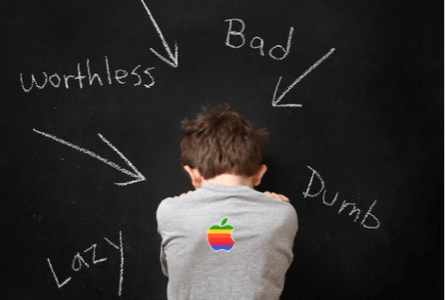
Earlier this year, a judge in the United Kingdom awarded a rare gift to Samsung in its global patent battle against Apple. The judge ruled that Samsung did not infringe on Apple’s design patents and offered a strange remedy: Apple must publically apologize to Samsung in prominent news publications in the UK and post the apology on its website for a month. Apple, full of pride (and a highly paid legal team) bristled at the judgment and appealed. The appeal was heard by a trio of judges and the verdict came down Wednesday. Sorry Apple, you still have a date with public shaming.
The purpose of the advertisement is to correct the impression that Samsung copied Apple’s design, specifically of the iPad. The ads will run in British publications such as the Daily Mail, Financial Times as well as on the Apple UK website. “The acknowledgement must come from the horse’s mouth,” the judges ruled, according to the BBC.
An Absurd Result
The absurdity of this trial should not be understated.
First, the subject. We are talking about design patents, something extremely hard to quantify. Much like the U.S. case in a California court between the companies, Apple claims that Samsung copied the front face and shape of the tablet. The original judge, Colin Birss, said that Samsung did not copy Apple because the Galaxy Tab in question did not have the “same understated and extreme simplicity possessed by Apple.” Famously, Birss also said that Samsung tablets were simply, “not as cool” as Apple’s iPad.
If coolness won court battles, the Fonz should have become a lawyer.
A Disturbing Trend
While many will delight in Apple’s public shaming, a disturbing trend is starting to emerge if you are one of the company top executives: Apple is losing most of its appeals.
For every big headline victory that Apple wins against Samsung or other mobile manufacturers, it seems like an equally large appeal wipes out those gains. Apple won a ban of the Samsung Galaxy Nexus earlier this year, only to have a U.S. appeals court toss out the ban. Apple won an injunction against HTC and its One X smartphone in the spring, only to have HTC redesign certain software aspects of the device and rerelease it. The One X is a quality device, so much so that we awarded it the ReadWrite Recommends Smartphone in September. A judge in Chicago more or less tossed out a patent suit between Apple and Motorola, telling the sides to negotiate a settlement.
Apple is even losing ground in a case that it originally won, the much-covered design and utility patent case in California that the iPhone maker won through a jury ruling. Samsung was ordered to pay Apple $1.05 billion in that case and injunctions on several devices were issues. One of those injunctions, against the Galaxy Tab 10.1 inch tablet, has already been dissolved by the judge overseeing the case.
Apple has also lost appeals to Samsung over design patents in Australia and the Netherlands.
Is Apple’s Legal Strategy Unraveling?
The California judgment has the potential to unravel on appeal as well. The primary point of contention in that case is that the jury foreman, Velvin Hogan, tainted the jury in favor of Apple because he was once sued by a former employer, Seagate Technology. Samsung happens to have a “strategic relationship” with Seagate. Samsung is asking for dismissal of the verdict.
Apple’s goal in many of these lawsuits is to stem the flood of quality Android devices that take attention away from the iPad and iPhone. If Apple cannot (or will not) go directly after Google to cut the head off the Android monster, the best it can do is give legal headaches to the manufacturers. Sometimes, those legal battles are effective, even if Apple does eventually lose on appeal. The injunction against the HTC One X caused it to lose thousands of potential unit sales.
Apple has spent millions in court on winning these lawsuits. Yet in the end, Cupertino may have little to show for its victories.
Image courtesy of Shutterstock.

















